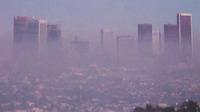U.S. environment regulator supports antismog rule
The U.S. government's top environmental regulator defended the Bush administration's proposal for new limits on smog.

Neither criticism pushed Environmental Protection Agency Administrator Stephen L. Johnson off his talking points Wednesday in an appearance before a Senate environmental panel.
"I concluded the current standard does not protect public health with an adequate margin of safety and should be strengthened," he testified repeatedly, saying that "I will be basing my decision on the science."
At issue was the EPA's recommendation, released last month, for the first new limits since 1997 on ground-level ozone - the combination of car exhaust, industrial emissions and gasoline vapors aggravated by summertime sun and heat and more commonly known as smog.
Smog is blamed for health risks for children, old people, and those suffering from asthma and other lung ailments.
EPA measures smog by calculating the concentration of ozone molecules in the atmosphere over an eight-hour period. The current standard is .084 parts per million. EPA is proposing reducing that to between .070 and .075 parts per million.
The agency will settle on a final figure by next March 12. The agency will accept public comments on the proposal for the next 90 days. EPA also is soliciting comments on alternate standards, including keeping the current one. That has sparked loud criticism from Democrats and environmentalists who attribute it to industry lobbying.
"Why do you hold the door open to .08 in your rule? Explain that. I don't understand it," asked Sen. Barbara Boxer, who chairs the Senate environmental panel.
Johnson started to say that he had heard from members of the public who wanted to keep the current level.
Boxer, a California Democrat, interrupted to demand to know who those people were.
"Typically it was members of industry, and typically members of the public health community told me that I needed to lower the standard," Johnson replied.
Boxer asked him if he was aware of a meeting last month among various industry groups and White House officials on the smog rule.
"I just want to make sure that they didn't do an end-run and somehow influence your people," Boxer said.
Johnson said he was not aware of the meeting and would have to get back to her.
Public documents on file with EPA, and released Wednesday by the group Environmental Defense, show that the White House Office of Management and Budget submitted language to EPA just before the smog proposal was released suggesting that changing the current standard without more research could "have an uncertain public health payoff." The OMB language was included nearly verbatim in EPA's proposal among the concerns the agency had heard.
Republican senators cautioned Johnson that tightening the smog rule would pose grave economic costs to communities that would ultimately be passed on to consumers.
Many areas still are not in compliance with the existing smog levels. States face loss of federal highway funds if they do not come up with compliance plans, but doing so is a yearslong process.
Subscribe to Pravda.Ru Telegram channel, Facebook, RSS!





